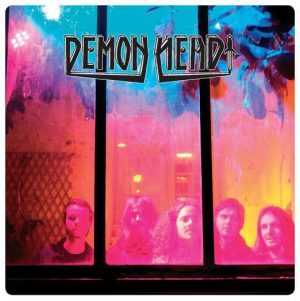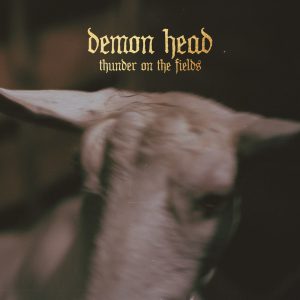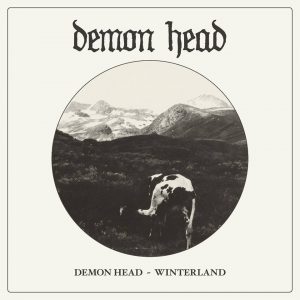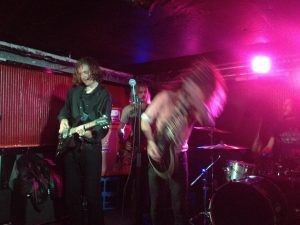
Danish sinister hard rockers Demon Head are about to unleash their second full-length album ‘Thunder On The Fields’ via The Sign Records and Caligari Records (it will also be available via Crypt Of The Wizard in London!). Their sound is a marvellously memorable mix of rockin’ riffing, Danzig-esque vocals and heady hooks, which will embed themselves into your memory, plus there’s an occult, organic nod to the past without sounding like a retro throwback. Their upcoming album has already caught the attention of Darkthrone drummer Fenriz, who recently made them a band of the week, and they’re set to turn more heads. We caught up with the band to find out more about this still quite mysterious musical entity.
You have a new album due out soon, what’s up with that?
B.G.N (guitar): You can expect a very generous and honest record that mostly take use of guitars, bass, drums, voice and words as instruments of expression.
M.S.F (bass): Real music for real people.
Are you chuffed with the end result?.
M.F.L (vocals): Yes, as Birk says it has been a lot of hard work; recording it ourselves, making the artwork (luckily with help for the final layout part). We are perfectionists about the songwriting and sound, and also decide things by consensus. Everyone has to agree on our wicked demon baby. But the record has turned out great, we can’t wait to set it loose!
M.S.F: I think it’s damn good, but to be honest I’m looking forward to the next one. It has been some time since we recorded the songs.
What formats will it be available on?
M.S.F: Every thing that can be played, which the Sign Records and Caligari Records have generously taken care of.
Please tell us about the album title…
M.F.L: I looked over the lyrics on the others’ requests to find a working title. It’s a menace or a promise on the horizon, beyond your sight. I think the songs and words on this record all have something of that in them, and as we wrote more music and built on what we had the theme became more present as a whole.
What themes/subjects inspired you to put pen to paper?
M.F.L: Most lyrics come from sentences or scenes that appear at strange times… and then I spend sleepless nights trying to put them into language, attribute meaning and make feelings or images intelligible. That being said, there are some themes; emancipation, foreboding, oppression, the fear of death and life, and burning love. It seems that the words tend to be formulated using references to the occult or the philosophical, while the lyrics are in fact mostly on the profane. And books are always good inspirations, to which there are some references.
 Tell us about the album cover concept? Simple but eye catching!
Tell us about the album cover concept? Simple but eye catching!
B.G.N: It is a photograph I took of a goat called, Topaz, or maybe Barrell, or something like that. It lives in a farming community in Canon Frome. We had a lot of different cover ideas, but none of them really contributed to the music as much as this photograph.
M.S.F: In the beginning I wasn’t sold on the idea, I had thought something more similar to ‘Ride The Wilderness’ [2015, their debut full-length]. But after the music took more shape, I came to understand the songs differently, and grew to fit well with Birk’s photo. The picture is its own, it doesn’t really look like something else, and it’s pretty eerie.
M.F.L: We had a lot of ideas, but in the end there’s something about the picture that disturbs you, while it’s not actually frightening. As the others say, it contributed to the music instead of trying to summarise it. And it’s a brilliant photograph.
The sound on the album is very powerful but organic. What did you hope to achieve with the production on the new album?
B.G.N: Personally I think a lot of rock albums produced today sound horrible. It’s as if you can’t really distinguish anything from the sound, especially not the song writing. The aesthetics of popular rock music has reached some sort a weird state that doesn’t allow much fragility. It’s quite boring really, listening to something that is not showing the whole picture, pretending to be something that it just isn’t. And I believe it communicates plastic emotions into the people listening to the music. I have hoped to achieve a way of playing and a sound that supports real emotions.
M.S.F: It was important that the sound fit the music, and not the other way around. I also hope the sound and the music help each other. The reason for producing the music afterwards is that you have one more chance to shape the songs or the atmosphere.
M.F.L: I don’t know if we thought to achieve something, but we have a strong collective work ethic when recording. As much as possible is live, to capture the unknown surplus that happens between us, and tape gives a sound that is more softly compressed, which simply sounds better to our ears. It also means that you can’t look at a screen and see sound waves, as it happens in digital production, but you have to rewind and play again, listen a lot, accept little mistakes if the general feeling hits the spot, make due with the tape time you have. The mixing and mastering was done by Lasse [Ballade Studios] this time, since we felt it was nice to have another set of ears, and maybe it was beyond our energy to do each and every part of the production. I guess we have been friendly but challenging to work with [laughs].
Where was the album recorded?
B.G.N: The album was recorded during ten winter days in a country house by the north coast of the island Zealand in Denmark. I was living there for some months and it seemed obvious for us to go there and record the songs. Thor (guitars), Marcus (vocals) and I were looking into buying a mixer that could upgrade the distinctive ‘Mackie’ sound of ‘Ride The Wilderness’. Then one day we almost literally stumbled upon a proper Neotek console for sale. Even though the price was quite fair, it was a lot money for us to spare, so we went to the pub for a further discussion and after some pints we decided to get it. And so with help from friends we transported this extremely heavy machine up to the country house. It was some intense 10 days, and it was great to be able to focus on the recording process without being too distracted by our daily lives.
M.F.L: We are best at doing it ourselves. Partly because we learn, and partly because it takes a lot of time until we’re satisfied. Going to Heather Hill is perfect, living as a commune, getting some distance from the daily grind… and the nature is beautiful.
What do you feel they contributed to the overall sound of the new album?
M.S.F: Lasse contributed with a lot of ideas that we wouldn’t have thought of ourselves, that have either fit well with the songs or sparked a determined counter-reaction. He opened up the sound of our recordings and made them more accessible.
B.G.N: He made it sound more clear and neutral. It was nice to try having someone to do the finishing of the sound. I don’t know if we’ll use him again though, I’ve learned that I prefer finishing the sound myself.
M.F.L: Lasse is, in his own words, a very modern metal producer. He has done a lot of punk, hardcore and metal, with a lot of clarity, and he agreed to work with us for the mixing to bring everything more forward. I think he’s done a really good job. In the future, though, I think we need to have our hands deep in the process from start to finish, in order to learn and mould even more.
Your sound lies somewhere between Witchcraft, Pentagram and Uncle Acid with the proto doom of Witchfinder General and classic Sabbath and the bluesy hard rock of classic Danzig, would you agree?
M.F.L: Depending on your ears, that could sound like fitting description. Our inspirations are very different, some of us are more into metal than others. For me, some of the bands you mentioned were more important when we started the band and on ‘Ride The Wilderness’. I suppose it’s still there somewhere.
B.G.N: Even though I like the music of some of bands you are naming, I can’t help to wonder why it is important to compare our music to that of others. I find it kind of downgrading when a specific band is being compared with other bands.
M.S.F: It’s a good mix of the ones you mentioned above, and more; Judas Priest, Thin Lizzy, a lot of punk. Demon Head was also inspired by friendship, as we travelled around in an old autocamper to festivals, saw a lot of bands, listened to many mixtapes, and realised that even though we played in bands, we didn’t have one together.
M.F.L: It grows and changes all the time, but some artists that I think continues to influence are some of the above, The Doors, Neil Young, Janis Joplin, Mercyful Fate, Iggy and the Stooges, Creedence Clearwater Revival, Girlschool, Dust, Wishbone Ash, old blues as Big Mama Thornton and Son House, punk bands, NWOBHM, folk from different times, and the friends we’ve travelled with such as Korp, Night Viper and Dunderhästen Blixten.
 How do you feel the new album differs from ‘Ride The Wilderness’?
How do you feel the new album differs from ‘Ride The Wilderness’?
B.G.N: To me ‘Thunder On The Fields’ is more honest. We have all contributed more individually to this record, and because we don’t share the complete same thoughts and inspirations, the songs are more complex and diverse in their sound. It is also a more subtle and mysterious record.
M.F.L: I think this is the natural growth of our music. Some of the songs were already on their way before’Ride The Wilderness’ was released, and some of them were finished while we recorded. The songs are more collective, a bit more sinister, and I’ve had a bit more singing experience [laughs]. Plus ‘Thunder On The Fields’ is more recent, introduces some new ideas and the songs are more thought through. And I think we’ve learned a lot from now years of practicing, writing, and playing on the road. Also the mixing console sounds leagues better than the notorious ‘Mackie’ sound.
B.G.N: We wanted it to sound better I think, especially we tried to produce a better drum sound. In the country house we were able to isolate all of the amplifiers in separate rooms so we could get a more acoustic drum sound. An then we were surfing the internet looking for quotes from sound enthusiasts who could unveil the secrets of different classic drum sounds and their microphone positioning. Personally I wanted to feel more connected with the guitar as an instrument and the songs we play. So quite early in the process of writing these songs I insisted on making space for what I want to communicate playing in a heavy rock band.
M.F.L: We wanted to do it better, and planned a lot prior to recording. As Birk said, we researched further and really dug into the fringes of recording techniques using old interviews, video material, pictures from records we like the sound of, while we had to be pragmatic, using whatever rooms, equipment and tools at hand. We also took more time, in hopes of not being stressed into accepting something because it would be convenient.
How does a typical Demon Head song come together?
B.G.N: We all pretty much contribute with ideas and sketches; be it a riff, a chords progression or a combination of the two. Then we play it in different ways, letting it take its shape in collaboration. Sometimes if I’ve got a more fixed idea of a complete song I record a very lo-fi demo and then I send to the others via email. I don’t know if they really listen to it, I don’t think so, but it helps me a lot to consider what is going in the music that im trying to write.
M.F.L: Mostly everyone contributes with ideas, and then we throw them into the fire pit between us. We record many demos, sometimes some of us listen to them, and over time, sometimes unexpectedly, they turn into music that we really like. Then they are played live many times, back in the rehearsal room and keep us awake at night. It’s not easy, but it is the only way it works for us. And there are always more on the way.
 How active are you as a live band?
How active are you as a live band?
B.G.N: We go on a couple of tours each year, so far mostly Scandinavia and Central Europe. We prefer playing in spaces that have a greater sense of community than most regular rock venues seem to have. So when we go on tour we try to schedule it around places that are run by love and try to avoid places that are run by money.
M.S.F: Playing concerts and traveling is something we try to do as much as possible and it is something I value highly. It gives me a lot of energy, even when I’m back home, working through the days.
M.F.L: We love playing live. There have been quite some tours in northern Europe by now, and these are adventures for us. We’re still thirsty for traveling to new places, meeting new friends and strangers. Usually we book everything ourselves, which for the most part works out. But it means that it’s important for us that people get in touch if they would like us to play in their home town! Invitation hereby extended. Two important things: We need to be able to play loud, and a minimum of 45 minutes unless you have a really good reason why it shouldn’t be so. Apart from that we’re easy to work with.
Where does Demon Head fit in with the current doom scene? What is the current heavy scene like in Denmark?
M.F.L: We feel we are part of a community that traverses the margins of genres. Especially DIY punk, rock and underground metal. We have been lucky enough to meet and experience great people in fantastic bands these past years; none mentioned, very few forgotten. The ‘heavy music scene’ as such does not really exist here but Copenhagen is a vivid city of music, again from many different genres that share spaces and, mostly, a community. Some recent bands that we enjoy and that might be worth your attention: Snor (from Malmö), Phrenelith, Slægt, 0%, Planet Y, Taphos, Hudsult, Puce Mary and Alucarda.
Future plans for rest of this year and beyond?
M.S.F: We will rehearse a lot, in order to write the songs for the third album. It feels like a very creative time for us as a band, even if it might not be that fast. As to concerts, we are planning a trip to England, Ireland, and hoping to play overseas.
Marcus: I hope we get to spend a lot of time together as friends, playing, writing music, and traveling. Meeting old friends and new friends. And ‘Thunder On The Fields’ will not be the last vinyl from us this year is all I can say for now. If you read this and have an idea for a trip we should make, or you put up concerts, please don’t hesitate to get in touch.
Copyright © 2024 Iron Fist Magazine. All Rights Reserved.